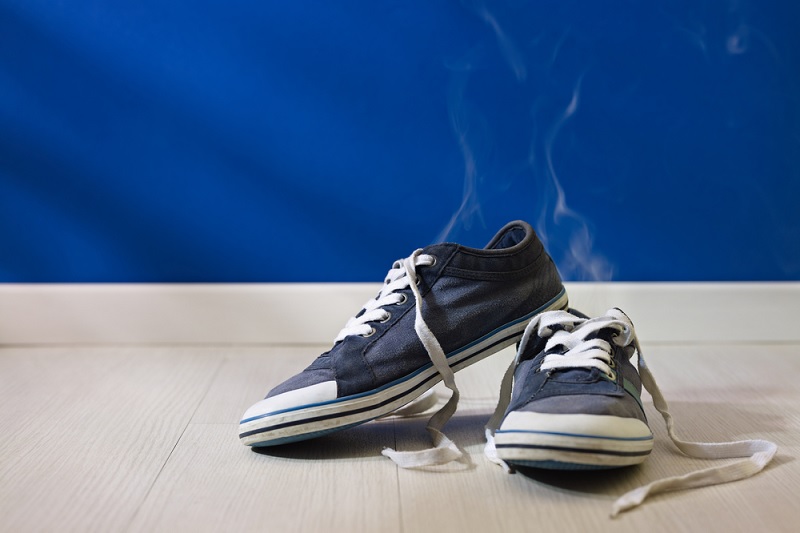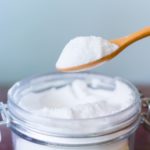It’s fairly common for shoes to smell after a day of wear. After all, your feet are trapped in there, and an enclosed shoe is the perfect breeding ground for smell-causing bacteria.
Luckily, it’s pretty easy to get the smell out of shoes. Below, we’ll cover a range of options for how to remove smells from shoes.
Make sure you read through the list before trying any to figure out which will work best for you.
Why Do Your Shoes Smell?
The first step is to figure out why your shoes smell. For most people, it’ll be because their feet sweat.
Bacteria feed on sweat and produce a nasty smell as a by-product. However, your shoes might smell because they’re dirty or wet, too.
But why does this matter? It generally doesn’t, but some of the tips below focus on killing bacteria over deodorising alone, or they focus on absorbing excess moisture.
What Are Your Shoes Made From?
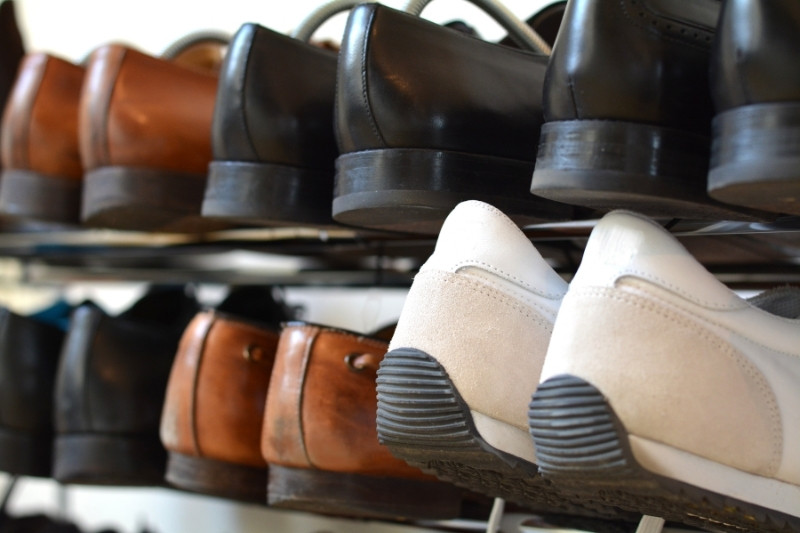
Another important point is to figure out what your shoes are made from. Generally, insoles will be foam, although some formal shoes will have leather insoles.
This is more important for the outer material, however. Although most solutions are suitable for all kinds of shoes, you’ll need to be more careful working with suede or leather.
It’s easier to stain these materials, and you can’t use water in the same way as you can with synthetic materials.
If you’re in doubt, stick to the safest options listed below.
How to Remove Smells from Shoes
The tips below will work on pretty much all shoes. We’ll mention if they won’t be suitable for some kinds of shoes, though.
1. Deodorising spray
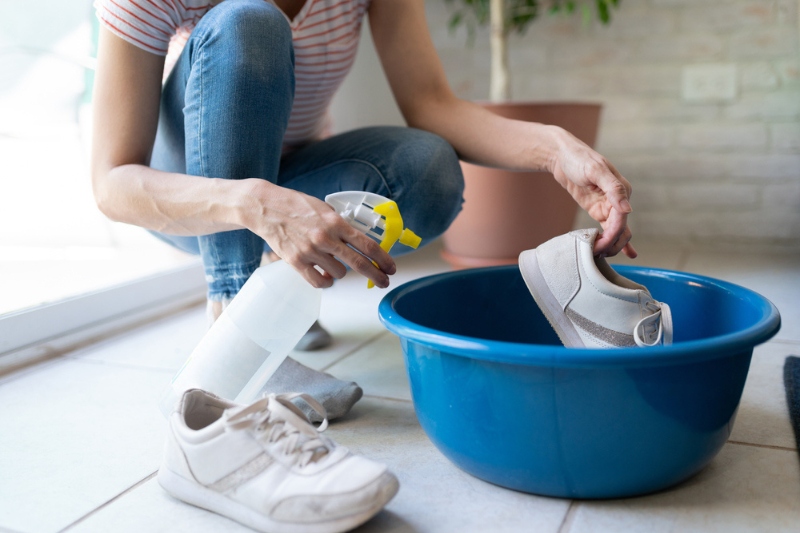
The most obvious solution is a shoe deodorising spray, such as this one from Scholl. It’s pretty straightforward: you spray it in the shoe, allow it to dry, and it’ll neutralise the odour.
Most sprays use alcohol, both to help neutralise smells and carry perfuming ingredients.
You should be conscious of using these sprays too much on leather shoes, as the alcohol can dry the leather out.
That said, you’d have to use a lot of this spray every day for that to become an issue!
2. DIY deodorising spray
While shoe sprays aren’t usually expensive, making your own at home is even cheaper.
Mix equal parts white vinegar and water and spray into your shoes with a spritz bottle. Leave it for a few minutes, wipe away any excess, and air dry.
This spray shouldn’t leave your shoes smelling like vinegar because the concentration isn’t high enough. If it does, reduce the amount of vinegar you use.
3. Wash your shoes
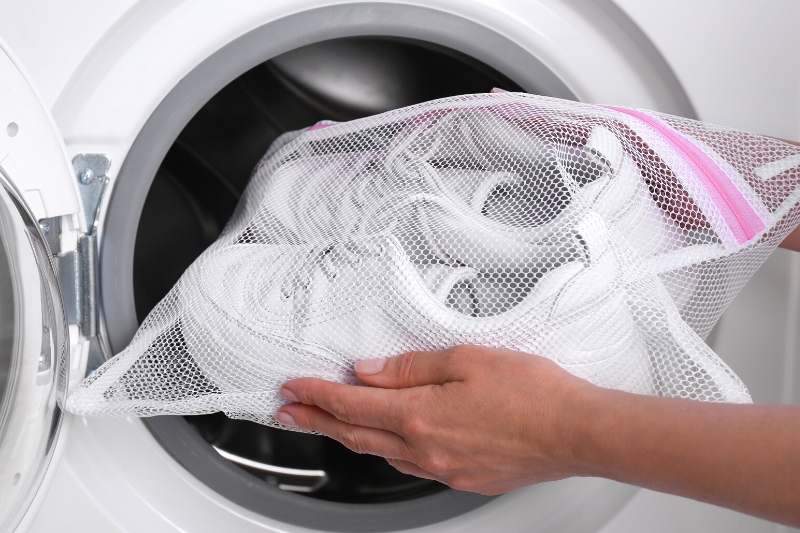
If you’re confident your shoes don’t have any leather components, you should be able to chuck them in the washing machine.
If your shoes came with some cleaning instructions, check these before putting them in the washing machine. You can also search online for recommendations from the brand itself.
The washing machine will help remove bacteria, but you must ensure you dry the shoes properly otherwise the smell will come back.
Wash on a 30-degree delicate cycle and throw in a few towels to cushion the machine’s drum.
To dry your shoes, stuff them with newspaper and leave somewhere with good airflow. You’ll want to ideally have them dry in 24 hours or so to prevent a damp smell.
4. Bicarbonate of soda
Bicarbonate of soda is a go-to for odour neutralisation. It works really well on all shoe materials, but it does mean you need to remove the powder somehow when it’s done.
Even if you knock it loose, you might end up with a white, powdery film inside your shoes.
If this is a risk you’re willing to take, sprinkle a small amount of bicarb in each shoe. Tap each shoe on a surface to distribute it evenly and then leave for 24 hours.
You can remove most of the bicarb with a cloth, or you could even stick a vacuum cleaner hose in there.
5. Replace your insoles
Insoles are a major culprit of smell in shoes, especially foam and fabric ones. This is true both for the insoles that come with your shoes and any extra insoles you might use.
Leather insoles shouldn’t hold smell as easily, but it’ll happen eventually.
Plenty of shoe brands should sell replacement insoles for their shoes – many trainers have fully removable insoles.
If you can’t remove the insoles yourself, take your shoes to a cobbler and they should be able to help.
6. Fill them with cat litter
This might seem like an odd suggestion, but it does work. As soon as you take your shoes off, sprinkle some deodorising cat litter in them.
It’s good for absorbing moisture and smells, making it almost perfect for this job.
Just make sure you don’t leave your shoes lying around otherwise your cat might mistake them for a toilet!
7. Wear socks
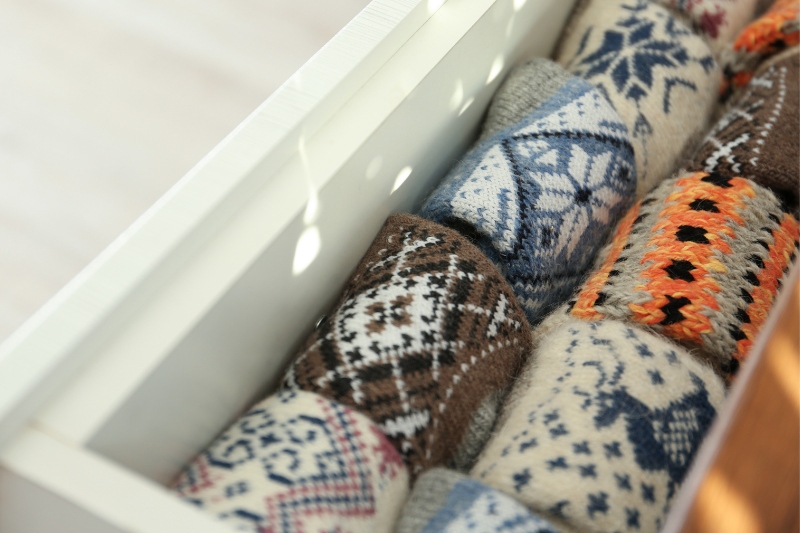
Preventing smelly shoes is just as useful as removing the smell. The easiest way to do this is to wear socks, specifically cotton. Socks help absorb sweat, preventing it from soaking into your shoes.
Of course, if you already wear socks and still have smelly shoes, this is a bit of a moot point.
8. Use essential oils

Some essential oils act as deodorisers and fungicides, meaning not only will they remove smells from your shoes but could also help prevent athlete’s foot. The best options for this are tea tree and clove.
Just put a few drops of essential oil in each shoe and leave to dry. You shouldn’t need to repeat this too often to keep the bacteria in your shoes at bay.
Final Thoughts
As you can see, there are plenty of options for removing smells from shoes. Depending on the severity of the issue, you’ll have more success with some solutions than others.
Things like bicarbonate of soda and deodorising spray are far more heavy-duty than essential oils.
Either way, make sure you wear socks and practice good foot hygiene to minimise the issue at its source. And don’t forget to regularly clean your shoes, too, no matter what they’re made from.

Jacob is a writer based in Wales, where he lives with his partner and two dogs. All his work is fuelled by extensive research and buckets of coffee.
